Welcome back to This Week in Apps, the weekly TechCrunch series that recaps the latest in mobile OS news, mobile applications and the overall app economy.
Global app spending reached $65 billion in the first half of 2022, up only slightly from the $64.4 billion during the same period in 2021, as hypergrowth fueled by the pandemic has slowed down. But overall, the app economy is continuing to grow, having produced a record number of downloads and consumer spending across both the iOS and Google Play stores combined in 2021, according to the latest year-end reports. Global spending across iOS and Google Play last year was $133 billion, and consumers downloaded 143.6 billion apps.
This Week in Apps offers a way to keep up with this fast-moving industry in one place with the latest from the world of apps, including news, updates, startup fundings, mergers and acquisitions, and much more.
Do you want This Week in Apps in your inbox every Saturday? Sign up here: techcrunch.com/newsletters.
Top Stories
Epic Games and Match attempt to expand their antitrust lawsuits against Google
Image Credits: Alex Tai/SOPA Images/LightRocket / Getty Images
Epic Games and Match Group are looking to fortify their antitrust lawsuits against Google by adding new counts to their initial complaint, filed last year, which illustrate the lengths Google supposedly went to in order to dominate the Android app market. The companies, a week ago, filed a motion to amend their complaints in their cases against Google, which now allege that Google paid off business rivals not to start other app stores that would put them in competition with Google Play. This would be a direct violation of U.S. antitrust law known as the Sherman Act, the amended complaint states.
Epic Games and Match Group had originally detailed Google’s plans in a filing last year, where they detailed a Google program known as “Project Hug,” or later, the “Apps and Games Velocity Program.” This effort was focused on paying game developers hundreds of millions of dollars in incentives to keep their games on the Google Play Store, it had said.
Now, Epic Games and Match Group are looking to add to their complaint with two new allegations specifying how Google had either paid or otherwise induced its potential competitors to agree to not distribute apps on Android in competition with the Play Store, including through their own competing app stores. Google, it reads, had identified developers who were “most at risk … of attrition from Play” and then approached them with an offer of an agreement.
The complaint now deems this a “per se” violation of Section 1 of the Sherman Act, which prohibits “every contract, combination in the form of trust or otherwise, or conspiracy, in restraint of trade or commerce among the several States, or with foreign nations,” it says. (You can read the full story here on TechCrunch.)
Google Play revamp continues
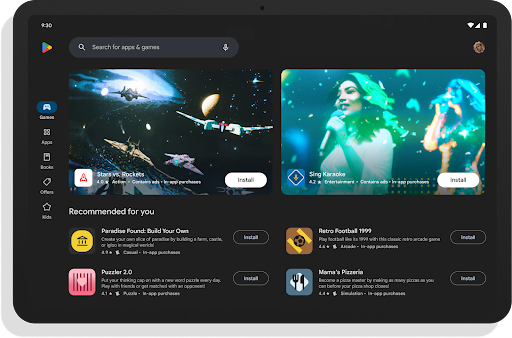
Image Credits: Google
Google announced this week new features for its Play Store that are designed to put more of developers’ store listing assets “front and center.” The company says that on large-screened devices, like tablets, foldables and Chromebooks, the Play Store redesign will make better use of app screenshots, videos and descriptions directly in the Apps and Games Home. This will help Android users when they’re browsing for new apps and games to install, Google says.
It’s also adding the ability for developers to upload Chromebook-specific screenshots in the Play Console, to better portray the Chromebook experience. Developers can upload up to eight screenshots, in the recommended 16:9 screenshots for landscape, with dimensions of 1080-7690px. Google is updating its quality guidelines for tablets for consistency across large screens, as well, but notes that previous uploads won’t be impacted by the changes.
Google additionally published a set of content quality guidelines to help developers learn best practices about how to showcase apps on large screens.
The changes announced this week follow an earlier revamp of the Play Store that offered users the ability to filter search results by device, making it easier for them to discover and download apps for non-phone devices like smartwatches, TVs and cars, including through remote installs. The feature was timely, given Google’s recent debut of its first Pixel-branded smartwatch this month.
BeReal’s real traction
Gen Z social media app BeReal encourages its users to take a photo every day — a format designed to create a daily habit. But only a small number of the app’s users are currently doing so, new estimates from a third-party app intelligence firm indicate. According to research from Sensor Tower, BeReal is demonstrating significant traction across some metrics — it topped 53 million worldwide installs across the App Store and Google Play and has seen its monthly active users jump by 2,254% since January 2022, for example. But only 9% of its active Android installs are opening the app every day as of the third quarter of this year, the firm found.
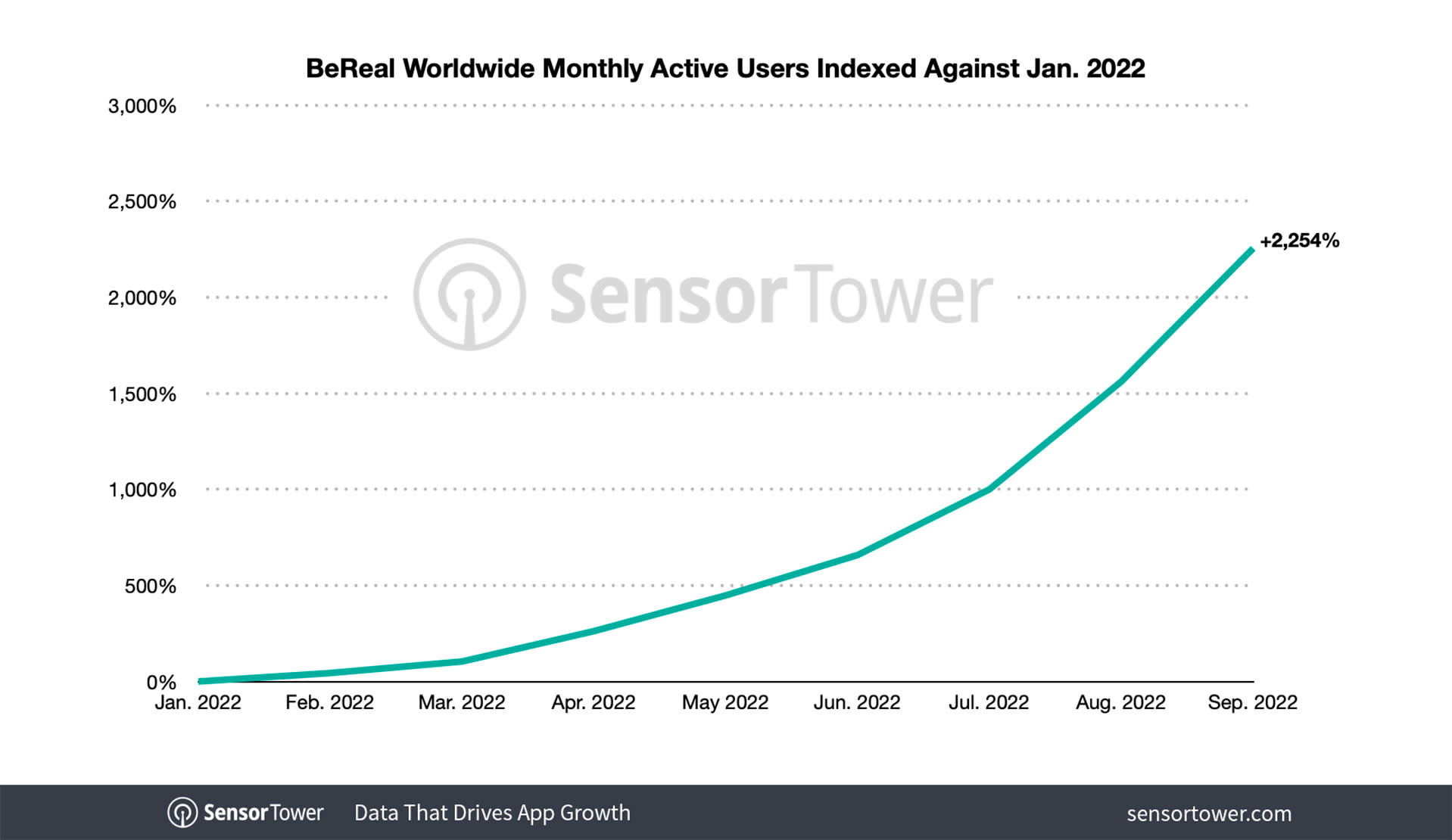
Active users are a better indication of an app’s adoption than downloads, as many people will install an app out of curiosity to check it out, but then abandon the app if they don’t end up enjoying the experience.
On this front, BeReal is still trailing established social media giants, Sensor Tower says. Today, 9% of BeReal’s active installs on Android (users who downloaded the app and are actively using it) are now launching the app daily. That’s far behind Instagram and TikTok. Instagram leads this category with 39% of its active installs opening the app every day, while TikTok comes in second with 29%. This is followed by Facebook, Snapchat, YouTube and Twitter at 27%, 26%, 20% and 18%, respectively.
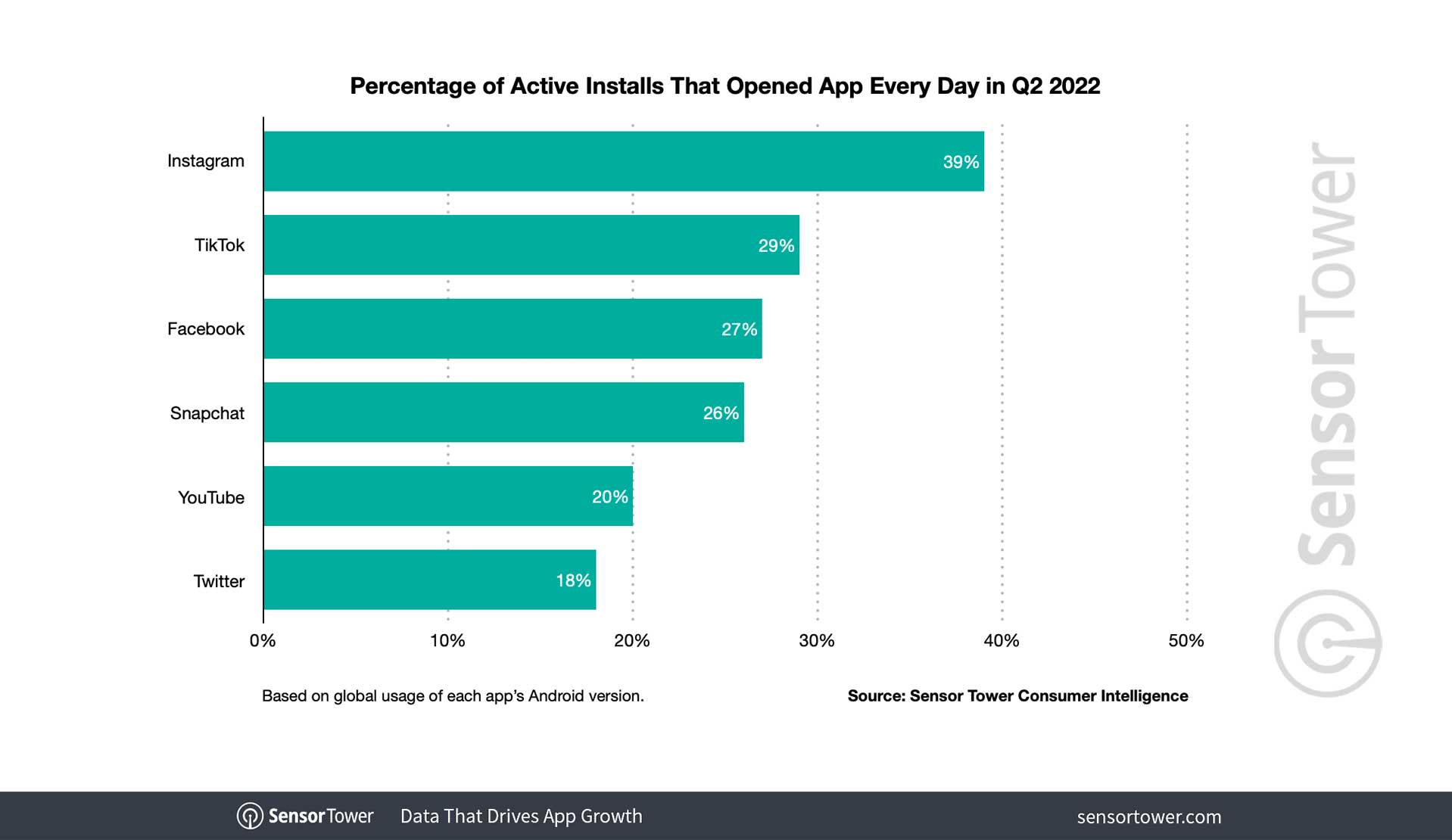
Image Credits: Sensor Tower
Of course, BeReal proponents point out that the app’s Android adoption is not at the same pace as iOS, as we said in our initial report. With many of its new installs being from young people in the U.S. — where iOS is preferred — this figure may not present a full picture of the app’s current usage. However, it’s a window into a company that’s media-averse, declining to speak to press on the record or share any of its metrics or growth, or even tout its funding. So for now, third-party data is what we have — and, if Android usage can be extrapolated to iOS, it shows that many of BeReal’s users aren’t necessarily everyday addicts. (Yet?)
Elsewhere, another mobile app data firm, 42matters, estimated BeReal’s MAUs on Android were only up by 633% this year, growing from 43,899 MAUs in January to 321,787 MAUs by August 2022. (You can read the full report here on TechCrunch.)
Weekly News
Platforms: Apple
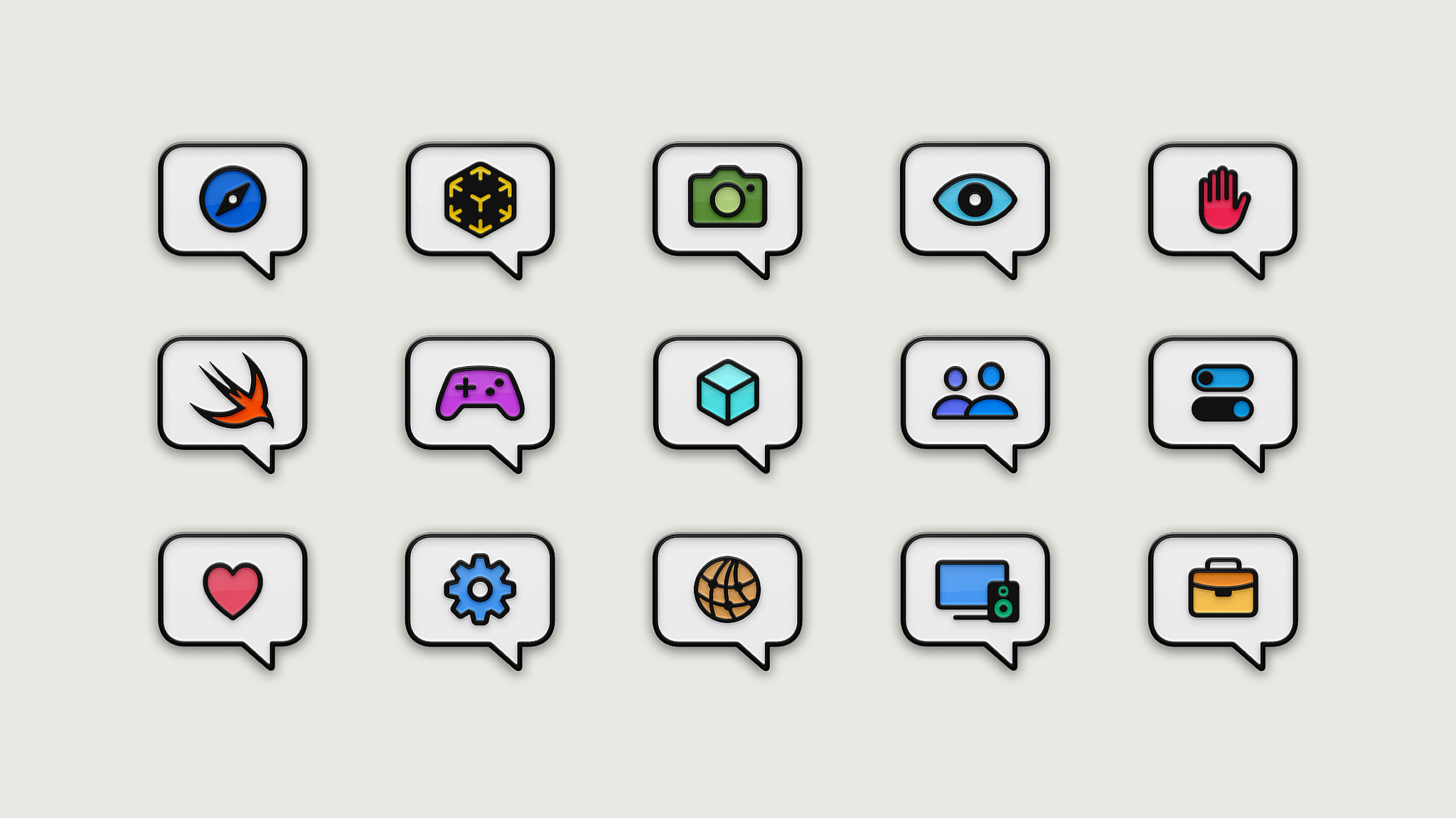
Image Credits: Apple
- Apple launched “Ask Apple,” a new series for app developers that allows them to connect directly with Apple experts for questions about integrating the latest technologies, design, testing and more. The sessions will run from October 17-21 and will include one-on-ones and group Q&As across multiple languages and time zones. To participate, developers will need to be members of either the Apple Developer Program or Apple Developer Enterprise Program.
- Apple Entrepreneur Camp applications are open and will close on December 5, 2022. The camp supports underrepresented founders and developers and will offer three online cohorts for female, Black or Hispanic/Latinx founders starting in January 2023.
- Apple will add 5G support to the iPhone 12, 13 and 14 models in India through an iOS update by December, The Economic Times reported. India’s government is pushing handset makers, like Apple and Samsung, to expedite software upgrades on their phones to make them compatible with local 5G airwaves.
- Apple is planning to launch iPadOS 16.1 alongside new hardware including MacBook Pros and new iPads in late October, Bloomberg reported. The iPad software update is expected the week of October 24, the report claims.
- As part of Microsoft’s announcements at its Ignite conference this week, Apple will be bringing more of its services, including Apple Music and iCloud storage with the Photos app in Windows 11, to Microsoft’s platforms.
- Apple rolled out iOS 16.1 beta 5 and watchOS 9.1 beta 5 to developers and as public betas. It also launched iOS 16.0.3 with fixes for the slow camera launch or slowness in changing camera modes, low microphone volume in CarPlay calls, delayed call and app notifications and more.
- Apple owners are reporting their iPhone 14 and Apple Watch’s crash detection features are being triggered by riding roller coasters.
Platforms: Google
- Google said its newly launched Pixel Watch will get at least three years of Wear OS updates, including security updates.
- Google approved the Truth Social app on the Play Store after the company updated its moderation policies. The app, which was denied entry in August 2022, said it would agree to enforce some policies around posts inciting violence, in order to gain approval.
E-commerce
- TikTok is planning to build its own fulfillment centers in the U.S., Axios reported, citing jobs posts in an effort to scale its e-commerce strategy. The company earlier this year was said to be dropping its live e-commerce “Shop” venture in the U.S., after it failed to gain traction abroad.
- Chinese fast fashion retailer Shein has seen its valuation decline from $100 billion+ to $65-85 billion in recent months, FT reports.
- Shein parent company, Zoetop, meanwhile has to pay $1.9 million in a fine to New York for a 2018 data breach that impacted 39 million Shein users and 7 million Romwe accounts.
Fintech & Crypto
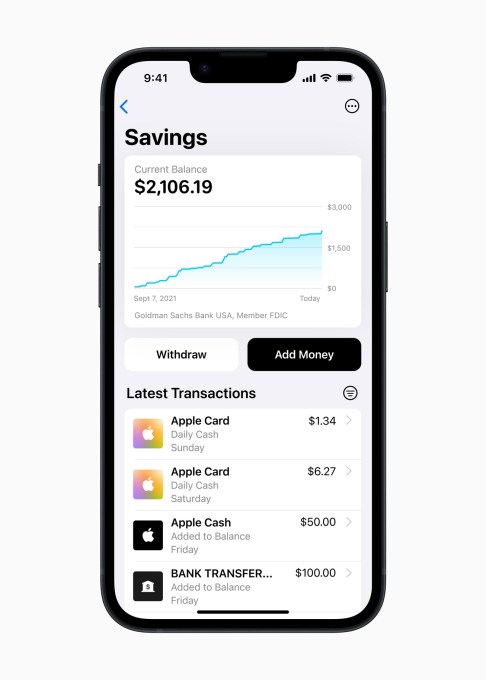
Image Credits: Apple
- Apple is partnering with Goldman Sachs to introduce high-yield savings accounts in the Wallet app for Apple Card holders. The accounts can be funded with Daily Cash (cashback) from card purchases or through linked bank account transfers. Support for the accounts will arrive with an iOS update in the “coming months.”
- Crypto.com Capital is backing a new effort called Magic Square that’s aiming to build an app store for web3 developers.
- Children’s financial app Greenlight introduced a suite of new family safety features, putting the app in closer competition with services like Life360. A new subscription, Greenlight Infinity, will include family location sharing, SOS and emergency alerts, crash detection with automatic 911 dispatch and more.
- Fintech app Betterment launched a new crypto offering that allows customers to choose from four themed, customizable portfolios of crypto assets.
- Samsung announced its Samsung Wallet will roll out to 13 more markets this year, including Bahrain, Denmark, Finland, Kazakhstan, Kuwait, Norway, Oman, Qatar, South Africa, Sweden, Switzerland, Vietnam and UAE. The wallet is already available in China, France, Germany, Italy, Korea, Spain, the U.K. and the U.S.
Social
- TikTok is expanding its set of third-party integrations with the launch of Profile Kit, which offers a way to embed videos on other sites. The first partner to adopt the new integration is Linktree.
- It also announced updates to its TikTok Creator Marketplace, including improved search, new recommendation tech, invite links, improved reporting and tools to anchor app store links or clickable links in comments. TikTok introduced Showtimes on TikTok for movie studios looking to promote films and connect users with ticketing partners, and a new campaign offering called Focused View, where brands only pay when users watch their ad for at least six seconds.
- TikTok plans to take action against exploitive begging on its app after a BBC investigation found Syrian refugees pleading for digital gifts from TikTok users.
- A U.K. report found that one-third of children between 8 and 17 with social media profiles were using fake ages to make them “adults” on the apps by signing up with fake birth dates.
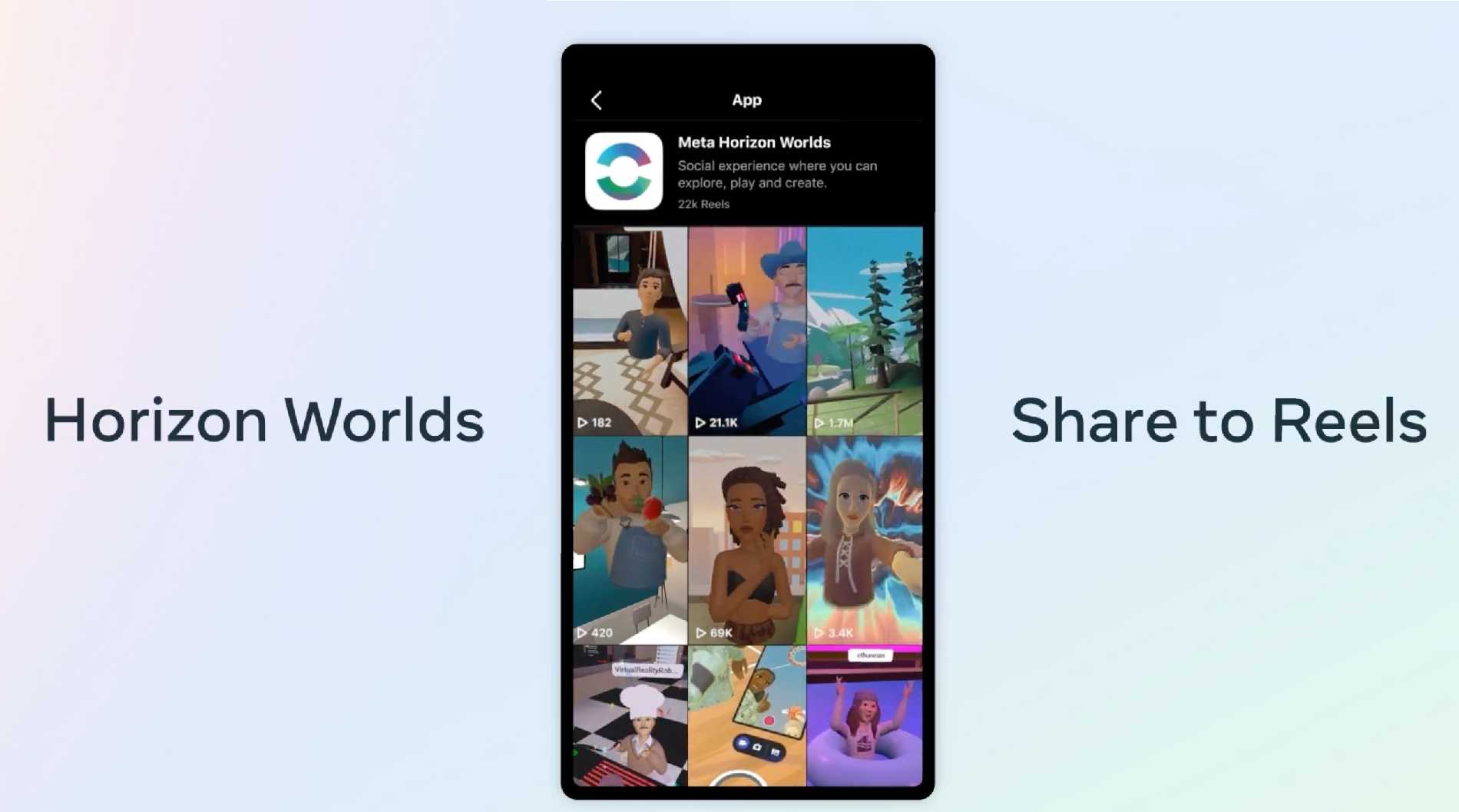
Image Credits: Meta
- Meta said videos from its VR space Horizon Worlds can now be shared to Instagram Reels. It also filed to dismiss the FTC complaint over its acquisition of VR fitness company, Within.
- Instagram expanded its AI-powered age verification program to India and Brazil, which, combined have around 400 million MAUs on the app. The verification program, which began testing in the U.S. earlier this year, runs video selfies through an AI system. Privacy advocates warn the California Age-Appropriate Design Code will lead to more invasive age verification practices like this.
- Twitter is now asking users to enter their birthdates to view sensitive content in its app, unless they have already done so and are over 18. The feature has no apparent built-in controls to prevent children lying about their age.
- Twitter is also developing a feature that would allow users to control who can @ mention them.
- Search-driven advertising has helped Pinterest stock rise 34% from its two-year low in mid-June, Bloomberg reported. This outpaces Meta and Snap, down 22% and 12%, respectively.
- Snapchat rolled out its parental controls to users in India through the new in-app Family Center. The launch follows the U.S. debut a couple of months ago, and allows parents to see who their teens are friends with and messaging on the app without being able to read the content of those messages.
- TechCrunch’s Rita Liao analyzes the potential challenges for Elon Musk’s super app plans: Elon Musk’s X app for ‘everything’ might be a non-starter in the U.S.
Messaging
- Signal announced it will soon be removing SMS support for Android users, explaining that it wants to simplify the experience for users instead of continuing to support two different messaging types in the app.
- A report by Rest of World looked into the issues around spam on WhatsApp in India, where users are complaining about receiving too much spam from brands, some of which are using WhatsApp’s own business tools.
- WhatsApp is beta testing a feature that allows users to put 1,024 friends into a single group chat.
- China’s internet censors have suspended thousands of WeChat accounts and removed posts following a protest in Beijing against “dictator and traitor Xi Jinping,” FT reported.
Streaming & Entertainment
- Netflix announced its ad-supported plan will go live next month. The $6.99 per month subscription will arrive in 12 markets to start, initially with Canada and Mexico on November 1 then the U.S., U.K., France, Germany, Italy, Australia, Japan, Korea and Brazil on November 3, followed by Spain on November 10.
- ByteDance is reportedly planning to expand its Resso streaming music service in more than a dozen global markets outside the U.S. and integrate it into the TikTok mobile app.
- YouTube announced the launch of “YouTube handles,” a way for creators to identify their channel using the @username format across channel pages, video descriptions, comments and Shorts. The handles will be rolled out gradually, becoming available first to creators with larger subscriber bases, but will ultimately be offered to everyone on YouTube.
- NBCU and Meta are partnering to bring VR experiences, including those from the Peacock app and shows like The Office, to its Quest headsets.
- Streaming media company Roku launched a new Roku Smart Home mobile app to support its expanded product line that now includes smart home devices like security cameras, video doorbells, smart lights and voice-enabled smart plugs. The devices are available at Roku.com and Walmart.com. A camera subscription service is also offered.
- Apple-owned Shazam updated its iOS app to offer users new wallpapers for the iPhone and Apple Watch. The app now includes an “Exclusive Downloads” section where users can customize their iPhone or watch with wallpapers from favorite artists.
Gaming
- Harry Potter-themed mobile games have generated a combined $1 billion in player spending globally to date, a report from Sensor Tower indicates. The game with the highest revenue is “Harry Potter: Hogwarts Mystery” from Jam City, which has earned more than $400 million since its April 2018 launch.
- A Newzoo gaming report on the habits of Gen Z users found that 70% of Gen Z are interested in socializing in in-game worlds beyond gameplay and 1 in 2 Gen Alpha and Gen Z users are spending money on games, compared with 42% of the total online population.
- Apple’s Music app launched on Xbox One, Xbox Series S and Xbox Series X. The app is a free download from the Microsoft Store.
- In the wake of Stadia’s demise, Google’s new gaming-focused Chromebooks from Acer, Asus and Lenovo will support cloud gaming services like Nvidia GeForce Now, Microsoft Xbox Cloud Gaming and Amazon Luna.
- Meta said its Quest Store has generated $1.5 billion in total revenue to date and that more than one-third of its 400 titles have grossed more than $1 million in sales; 33 titles surpassed $10 million in gross revenue. It also announced the game Among Us will head the Quest 2 platform on November 10.
Health & Fitness
- Diet and health coaching app Noom laid off 10% of its workforce, or around 500 people, mostly from its coaching team. The company was valued at $3.7 billion in May 2021.
Productivity
- Google Meet added automatic meeting transcriptions and said its companion mode will now work on mobile devices. Also, users with AI-powered cameras from Huddly and Logitech can now use adaptive framing.
- Google Docs to soon allow users to embed other apps into docs, including those from Asana, Miro, Figma and Tableau.
- Microsoft announced a number of new apps and features at its Ignite conference, including a Teams Premium subscription, which includes customized avatars and AI features like Intelligent Recap for meetings; a new app called Places aimed at helping companies address hybrid work challenges; and plans to integrate DALL-E 2 with its new Microsoft Designer app and Image Creator tool.
Utilities
- Google’s keyboard app Gboard updated with support for Android tablet layout, which includes easier-to-type on keys and an overall taller keyboard.
- Samsung and Google partnered to allow Samsung’s SmartThings app users to onboard Matter-enabled devices even if they’re set up in Google Home and vice versa.
Reading & News
- Instapaper rolled out an update, version 8.2 on iOS, that introduced in-article search, text justification and several other design updates. Among the changes, users can now manually add a link from the side menu by tapping on the + icon instead of worrying about clipboard detection prompts — useful, considering iOS has cracked down on apps reading users’ clipboards with an initially buggy security feature.
Security & Privacy
- Google rolled out support for signing in with passkeys — a new way to sign in on the web and in apps without using passwords — on Android and Chrome to beta testers. The feature is expected to launch more broadly later this year.
- Security researchers discovered that many apps associated with Apple services on iOS 16 send data that bypass users’ VPN connections.
Funding and M&A
 Real estate investing app Fintor raised $6.2 million at an $80 million valuation in an extension round from existing investors including Public.com, Hustle Fund, 500 Global, VU Ventures, Graphene Ventures and angel investors such as Manny Khoshbin, Andy Madadian, Cindy Bi and Marcus Ridgway. The app allows non-accredited investors to invest in real estate.
Real estate investing app Fintor raised $6.2 million at an $80 million valuation in an extension round from existing investors including Public.com, Hustle Fund, 500 Global, VU Ventures, Graphene Ventures and angel investors such as Manny Khoshbin, Andy Madadian, Cindy Bi and Marcus Ridgway. The app allows non-accredited investors to invest in real estate.
 Teen banking app Step borrowed $300 million in debt financing led by Triplepoint Capital and Evolve Bank & Trust. To date, the company has raised $500 million in equity and debt. Last year, Step raised a Series C equity round from investors including Coatue, Stripe and angels such as Charli D’Amelio and Jared Leto. The app will also now expand into crypto.
Teen banking app Step borrowed $300 million in debt financing led by Triplepoint Capital and Evolve Bank & Trust. To date, the company has raised $500 million in equity and debt. Last year, Step raised a Series C equity round from investors including Coatue, Stripe and angels such as Charli D’Amelio and Jared Leto. The app will also now expand into crypto.
 Paris-based Homa, which offers an SDK to indie mobile game studios, raised $100 million in Series B funding, led by Quadrille Capital and Headline. The SDK offers tools for tracking metrics in order to improve session and retention times, along with other A/B testing tools.
Paris-based Homa, which offers an SDK to indie mobile game studios, raised $100 million in Series B funding, led by Quadrille Capital and Headline. The SDK offers tools for tracking metrics in order to improve session and retention times, along with other A/B testing tools.
 Cairo-based fintech app Telda raised $20 million in seed funding led by Sequoia Capital and Global Founders Capital, with Block also participating. The app offers money management, payments and offers a Mastercard-powered card. The company has onboarded 25,000 users and has a waitlist of 110,000.
Cairo-based fintech app Telda raised $20 million in seed funding led by Sequoia Capital and Global Founders Capital, with Block also participating. The app offers money management, payments and offers a Mastercard-powered card. The company has onboarded 25,000 users and has a waitlist of 110,000.
 London-based GoHenry, a digital banking app aimed at kids, raised £49 million+ ($55 million) in Series B funding. The company said 2021 revenue grew 55% year-over-year to £30.5 million, with losses up 20x year-over-year. The startup claims to have 2 million users.
London-based GoHenry, a digital banking app aimed at kids, raised £49 million+ ($55 million) in Series B funding. The company said 2021 revenue grew 55% year-over-year to £30.5 million, with losses up 20x year-over-year. The startup claims to have 2 million users.
 Lego parent company Kirkbi is acquiring the U.S. edtech company Brainpop, which makes short educational videos for kids, for $875 million. Brainpop’s videos, available online and through its apps, reached around 25 million children per year across two-thirds of U.S. school districts.
Lego parent company Kirkbi is acquiring the U.S. edtech company Brainpop, which makes short educational videos for kids, for $875 million. Brainpop’s videos, available online and through its apps, reached around 25 million children per year across two-thirds of U.S. school districts.
Downloads
Yonder
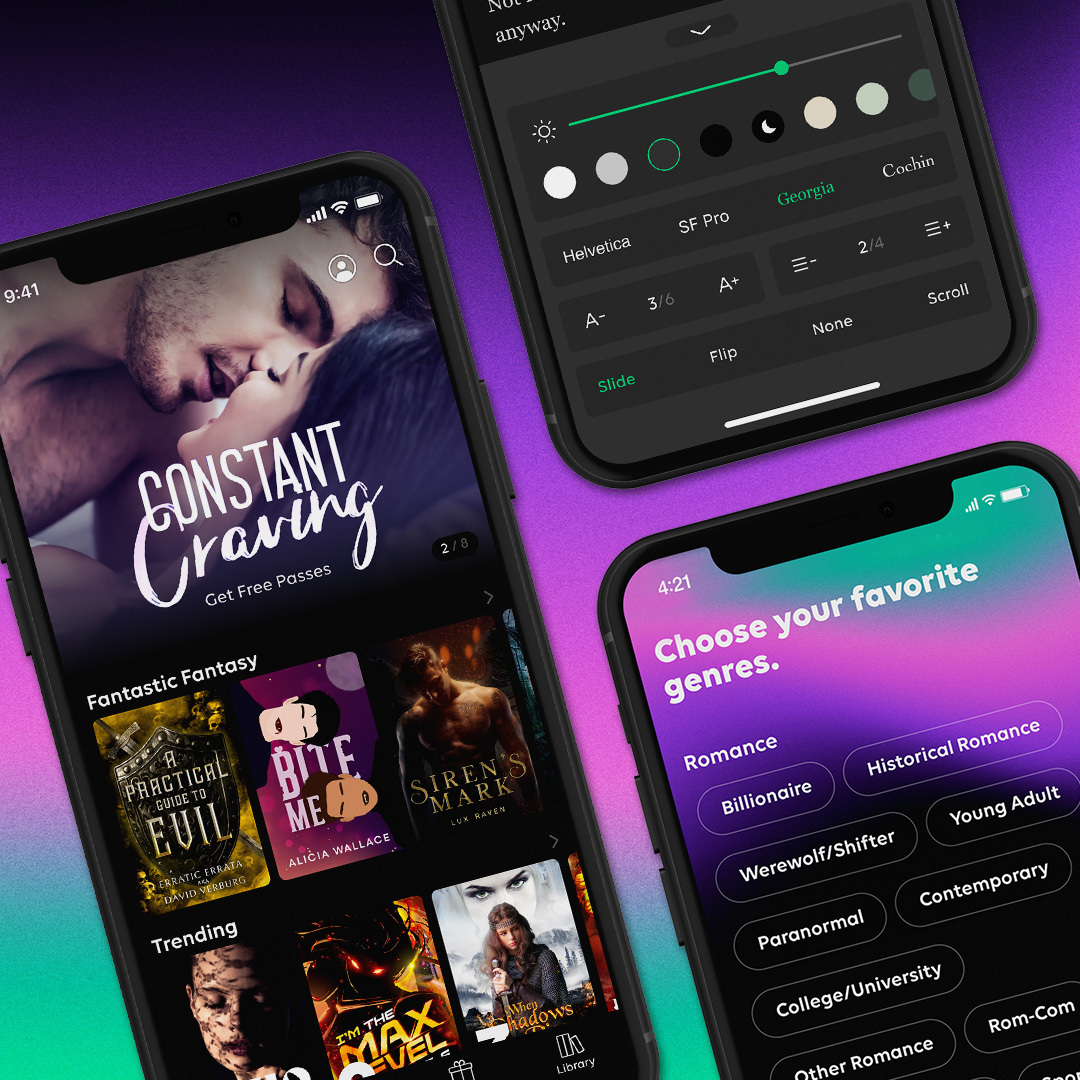
Image Credits: Naver
Naver, the parent company behind Webtoon and Wattpad reading apps reaching a combined 200 million monthly users, has launched a new app called Yonder, a serialized fiction platform. The app aims to attract both those who are already avid consumers of serialized fiction as well as those new to the space but looking for a more premium experience without ads or distractions.
At launch, Yonder will include hundreds of titles and exclusives from authors like romance author Ivy Smoak (The Hunted Series), bestsellers P.C. Cast and Kristin Cast (House of Night) and fantasy author Ruby Dixon, along with titles from publishers including Blackstone Publishing, Aetheon, Sterling and Stone, Portal Books and Wraithmarked. Unlike Naver’s Wattpad and Webtoon app, where anyone can contribute, Yonder’s stories are curated.
To monetize, the app will offer users the ability to explore and read several chapters for free, then unlock the rest of the story using virtual coins purchased in-app. The app will be available on Android and soon, iOS.

This Week in Apps: Play Store revamp, Google antitrust suit updates, BeReal’s real traction by Sarah Perez originally published on TechCrunch
Source : This Week in Apps: Play Store revamp, Google antitrust suit updates, BeReal’s real traction









